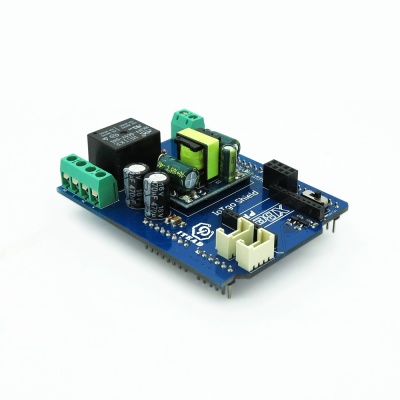Difference between revisions of "IoTgo Shield"
From ITEAD Wiki
(Created page with "==Overview== thumb With an on-board AC-DC module, Arduino IoTgo shield can transfer AC 110~250V to DC 5V, so it can be the power sup...") |
m |
||
| Line 34: | Line 34: | ||
| − | =Pinmap== | + | ==Pinmap== |
*Nrf24L01 Socket | *Nrf24L01 Socket | ||
{| class="wikitable" | {| class="wikitable" | ||
| Line 74: | Line 74: | ||
|- | |- | ||
|} | |} | ||
| + | |||
| + | ==Useful Link== | ||
| + | |||
| + | |||
| + | ==Download== | ||
Revision as of 03:40, 10 January 2015
Contents
Overview
With an on-board AC-DC module, Arduino IoTgo shield can transfer AC 110~250V to DC 5V, so it can be the power supply to arduino. Meanwhile, mainboards can control some home applications by setting the relays on this shield. Moreover, IoTgo shield has an Xbee interface and a Nrf24l01 interface. By using this shield, you can make some remote control home application projects with effortless.
Specifications
| PCB size | 76.96mm X 59.56mm X 1.6mm |
| Power supply | AC 85~265V 50/60Hz |
| Power output | DC5V |
Electrical Characteristics
| Min | Type | Max | Unit | |
| Power Voltage | 85 | 220 | 265 | AVCC |
| AC-DC 5V Output average current | 0 | - | 700 | mA |
| Max load current(relay) | 3 | A | ||
| Ripple wave voltage(Vpp) | 80 | 150 | 200 | mV |
Hardware
Pinmap
- Nrf24L01 Socket
| Index of Interface | Name of Interface | Index of Arduino |
| 1 | GND | - |
| 2 | 3V3 | |
| 3 | CE | D8 |
| 4 | CS | D9 |
| 5 | SCK | D13 |
| 6 | MOSI | D11 |
| 7 | MISO | D12 |
| 8 | IRQ | - |
- AC socket
| Index of Interface | Name of Interface | Description |
| 1 | N | Zero line |
| 2 | L | Live line |
| 3 | NO | Shorted to L while relay is activated |
| 4 | NC | Shorted to L while relay is not activated |
 Notice
Notice